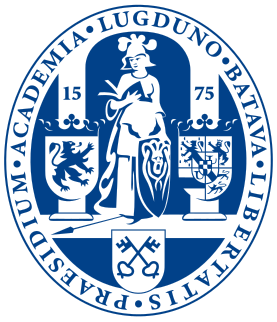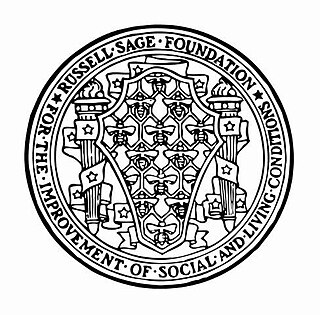Related Research Articles

Leiden University is a public research university in Leiden, Netherlands. The university was founded as a Protestant university in 1575 by William, Prince of Orange as a reward to the city of Leiden for its defence against Spanish attacks during the Eighty Years' War. It is the oldest institution of higher education in the Netherlands, as well as one of the most reputed in the country and Europe.

Nuffield College is one of the constituent colleges of the University of Oxford in England. It is a graduate college and specialises in the social sciences, particularly economics, politics and sociology. Nuffield is one of Oxford's newer colleges, having been founded in 1937, as well as one of the smallest, with around 90 postgraduate students and 60 academic fellows. It was also the first Oxford college to accept both men and women, having been coeducational since its foundation.
Medical anthropology studies "human health and disease, health care systems, and biocultural adaptation". It views humans from multidimensional and ecological perspectives. It is one of the most highly developed areas of anthropology and applied anthropology, and is a subfield of social and cultural anthropology that examines the ways in which culture and society are organized around or influenced by issues of health, health care and related issues.

There are wide varieties of economic inequality, most notably income inequality measured using the distribution of income and wealth inequality measured using the distribution of wealth. Besides economic inequality between countries or states, there are important types of economic inequality between different groups of people.

Social mobility is the movement of individuals, families, households, or other categories of people within or between social strata in a society. It is a change in social status relative to one's current social location within a given society. This movement occurs between layers or tiers in an open system of social stratification. Open stratification systems are those in which at least some value is given to achieved status characteristics in a society. The movement can be in a downward or upward direction. Markers for social mobility, such as education and class, are used to predict, discuss, and learn more about an individual or a group's mobility in society.
The Nuffield Foundation is a charitable trust established in 1943 by William Morris, Lord Nuffield, the founder of Morris Motors Ltd. It aims to improve social well-being by funding research and innovation projects in education and social policy, and building research capacity in science and social science. Its current chief executive is Tim Gardam.
John Harry Goldthorpe is a British sociologist. He is an emeritus Fellow of Nuffield College, Oxford. His main research interests are in the fields of social stratification and mobility, and comparative macro-sociology. He also writes on methodological issues in relation to the integration of empirical, quantitative research and theory with a particular focus on issues of causation.
Gordon Marshall is a British sociologist and former Director of the Leverhulme Trust in England.

The Russell Sage Foundation is an American non-profit organisation established by Margaret Olivia Sage in 1907 for “the improvement of social and living conditions in the United States.” It was named after her recently deceased husband, railroad executive Russell Sage. The foundation dedicates itself to strengthening the methods, data, and theoretical core of the social sciences in order to better understand societal problems and develop informed responses. It supports visiting scholars in residence and publishes books and a journal under its own imprint. It also funds researchers at other institutions and supports programs intended to develop new generations of social scientists. The foundation focuses on labor markets, immigration and ethnicity, and social inequality in the United States, as well as behavioral economics.

Nikolas Rose is a British sociologist and social theorist. He is Distinguished Honorary Professor at the Research School of Social Sciences, in the College of Arts and Social Sciences at the Australian National University and Honorary Professor at the Institute of Advanced Studies at University College London. From January 2012 to until his retirement in April 2021 he was Professor of Sociology in the Department of Global Health and Social Medicine at King's College London, having joined King's to found this new Department. He was the Co-Founder and Co-Director of King's ESRC Centre for Society and Mental Health. Before moving to King's College London, he was the James Martin White Professor of Sociology at the London School of Economics, director and founder of LSE's BIOS Centre for the Study of Bioscience, Biomedicine, Biotechnology and Society from 2002 to 2011, and Head of the LSE Department of Sociology (2002–2006). He was previously Professor of Sociology at Goldsmiths, University of London, where he was Head of the Department of Sociology, Pro-Warden for Research and Head of the Goldsmiths Centre for Urban and Community Research and Director of a major evaluation of urban regeneration in South East London. He is a Fellow of the British Academy, the Royal Society of Arts and the Academy of Social Sciences, and a Fellow of the Royal Danish Academy of Science and Letters. He holds honorary doctorates from the University of Sussex, England, and Aarhus University, Denmark.

Social inequality occurs when resources in a given society are distributed unevenly, typically through norms of allocation, that engender specific patterns along lines of socially defined categories of persons. It is the differentiation preference of access of social goods in the society brought about by power, religion, kinship, prestige, race, ethnicity, gender, age, sexual orientation, and class. Social inequality usually implies the lack of equality of outcome, but may alternatively be conceptualized in terms of the lack of equality of access to opportunity. The social rights include labor market, the source of income, health care, and freedom of speech, education, political representation, and participation.
The Nuffield Council on Bioethics is a UK-based independent charitable body, which examines and reports on bioethical issues raised by new advances in biological and medical research. Established in 1991, the Council is funded by the Nuffield Foundation, the Medical Research Council and the Wellcome Trust. The Council has been described by the media as a 'leading ethics watchdog', which 'never shrinks from the unthinkable'.
The various academic faculties, departments, and institutes of the University of Oxford are organised into four divisions, each with its own Head and elected board. They are the Humanities Division; the Social Sciences Division; the Mathematical, Physical and Life Sciences Division; and the Medical Sciences Division.
Anthony Francis Heath, CBE, FBA is a British sociologist who is a professor of sociology at Oxford University and a professorial fellow of Nuffield College, Oxford.

Dame Sarah Jane Macintyre, known as Sally Macintyre, is a British medical sociologist. She is a Professor Emerita at the University of Glasgow.
Melinda Mills, is a Canadian and Dutch demographer and sociologist. She is currently the Nuffield Professor of Sociology at Nuffield College, University of Oxford. Mills’ research spans a range of interdisciplinary topics at the intersection of demography, sociology, molecular genetics and statistics. Her substantive research specializes in fertility and human reproductive behaviour, assortative mating, labour market, life course and inequality.

Stephen Lawrence Morgan is a Bloomberg Distinguished Professor of Sociology and Education at the Johns Hopkins University School of Arts and Sciences and Johns Hopkins School of Education. A quantitative methodologist, he is known for his contributions to quantitative methods in sociology as applied to research on schools, particularly in models for educational attainment, improving the study of causal relationships, and his empirical research focusing on social inequality and education in the United States.
David Rudyard Williams is the Florence Sprague Norman and Laura Smart Norman Professor of Public Health at the Harvard School of Public Health, as well as a Professor of African and African American Studies and of Sociology at Harvard University.
Jennie E. Brand is an American sociologist and social statistician. She studies stratification, social inequality, education, social demography, disruptive events, and quantitative methods, including causal inference. Brand is currently Professor of Sociology and Statistics at the University of California, Los Angeles (UCLA), where she directs the California Center for Population Research and co-directs the Center for Social Statistics.
Juho Härkönen is a Finnish academic, currently professor of sociology in the Department of Political and Social Sciences at the European University Institute (EUI) in Florence, Italy.
References
- ↑ Christiaan Willem Simon Monden, Education, inequality and health the impact of partners and life course, PhD Dissertation at Radboud University Nijmegen, 2003
- ↑ Dr Christiaan Monden. Nuffield College. Retrieved 28 May 2015.
- ↑ "Unevenly distributed: Twins in developing countries".
- ↑ Jeroen Smits, Christiaan Monden. Twinning across the Developing World. PLoS ONE, 2011; 6 (9): e25239 DOI: 10.1371/journal.pone.0025239